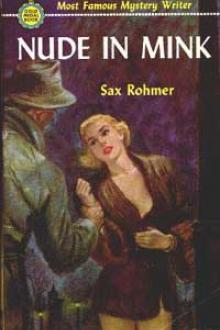The Bandbox by Louis Joseph Vance (read novels website .txt) 📕

- Author: Louis Joseph Vance
- Performer: -
Book online «The Bandbox by Louis Joseph Vance (read novels website .txt) 📕». Author Louis Joseph Vance
Staff’s gaze sought the indicated direction. “Roches Point, I imagine; we’re about due at Queenstown ...”
“As late as that?” The girl moved as if to rise. Staff jumped up and offered her a hand. In a moment she was standing beside him. “I must go below,” said she. “Good night.”
“You won’t tell me who it was in Lucille’s, yesterday?” he harked back pleadingly.
She shook her head gaily as she turned forward to the main companionway entrance: “No; you must find out for yourself.”
“But perhaps it isn’t a practical joke?”
“Then—perhaps—I shall tell you all—sometime.”
He paused by the raised door-sill as she stepped within the superstructure. “Why not stop up and see the tender come off?” he suggested. “It might be interesting.”
She flashed him a look of gay malice. “If we’re to believe Mrs. Ilkington, you’re apt to find it more interesting than I. Good night.”
“Oh—good night!” he muttered, disturbed; and turned away to the rail.
His troubled vision ranged far to the slowly shifting shore lights. The big steamship had come very close inshore—as witness the retarded speed with which she crept toward her anchorage—but still the lights, for all their singular brightness, seemed distant, incalculably far away; the gulf of blackness that set them apart exaggerated all distances tenfold. The cluster of sparks flanked by green and red that marked the hovering tender appeared to float at an infinite remove, invisibly buoyed upon the bosom of a fathomless void of night.
Out of this wind-swept waste of impenetrable darkness was to come the answer to these many questions that perplexed him—perhaps. Something at least would come to influence him; or else Mrs. Ilkington’s promise had been mere blague.... Then what?
Afterwards he assured himself that his stupidity had been unparalleled inconceivable. And indeed there seems to be some colour of excuse for this drastic stricture, self-inflicted though it were.
Below him, on the main deck, a squad of deckhands superintended by a petty officer was rigging out the companion-ladder.
Very suddenly—it seemed, because of the immense quiet that for all its teeming life enveloped the ship upon the cessation of the engine’s song—the vessel hesitated and then no longer moved. From forward came the clank of chains as the anchor cables were paid out. Supple to wind and tide, the Autocratic swung in a wide arc, until the lights of the tender disappeared from Staff’s field of vision.
Before long, however, they swam silently again into sight; then slowly, cautiously, by almost imperceptible stages the gap closed up until the tender ranged alongside and made fast to her gigantic sister.
Almost at once the incoming passengers began to mount the companion-ladder.
Staff promptly abandoned his place at the rail and ran down to the main-deck. As he approached the doorway opening adjacent to the companion-ladder he heard a woman’s laugh out on the deck: a laugh which, once heard, was never to be forgotten: clear, sweet, strong, musical as a peal of fairy bells.
He stopped short; and so did his breath for an instant; and so, he fancied, did his heart. This, then, was what Mrs. Ilkington had hinted at! But one woman in all the world could laugh like that ...
Almost at once she appeared, breaking through the cluster of passengers on the deck and into the lighted interior with a swinging, vigorous manner suggestive of intense vitality and strength. She paused, glancing back over her shoulder, waiting for somebody: a magnificent creature, splendidly handsome, wonderfully graceful, beautiful beyond compare.
“Alison!” Staff breathed hoarsely, dumfounded.
Though his exclamation could by no means have carried to her ears, she seemed to be instantly sensitive to the vibrations of his emotion. She swung round, raking her surroundings with a bright, curious glance, and saw him. Her smile deepened adorably, her eyes brightened, she moved impulsively toward him with outflung hands.
“Why,” she cried—“Why, Staff! Such a surprise!”
Nothing could have been more natural, spontaneous and unaffected. In an instant his every doubt and misgiving was erased—blotted out and as if it had never been. He caught and held her hands, for the moment speechless. But his eyes were all too eloquent: under their steadfast sincerity her own gaze wavered, shifted and fell. She coloured consummately, then with a gentle but determined manner disengaged her hands.
“Don’t,” she said in the low, intimate voice she knew so well how and when to employ—“don’t! People are looking ...” And then with a bewildering shift, resuming her former spirit: “Of all things wonderful, Staff—to meet you here!”
She was acting—masking with her admirable art some emotion secret from him. He knew this—felt it intuitively, though he did not understand; and the knowledge affected him poignantly. What place had dissimulation in their understanding? Why need she affect what she did not feel—with him?
Distressed, bewildered, he met evasion with native straightforwardness.
“I’m stunned,” he told her, holding her eyes with a grave, direct gaze; “I’m afraid I don’t understand.... How does this happen?”
“Why, of course,” she said, maintaining her artificial elation—“I infer—you’ve finished the play and are hurrying home. So—we meet, dear boy. Isn’t it delightful?”
“But you’re here, on this side—?”
“Oh, just a flying trip. Max wanted me to see Bisson’s new piece at the Porte St. Martin. I decided to go at the last moment—caught the Mauretania on eight hours’ notice—stayed only three days in Paris—booked back on this tub by telegraph—travelled all day to catch it by this wretched, roundabout route. And—and there you are, my dear.”
She concluded with a gesture charmingly ingenuous and disarming; but Staff shook his head impatiently.
“You came over—you passed through London twice—you stayed three days in Paris, Alison—and never let me know?”
“Obviously.” She lifted her shoulders an inch, with a light laugh. “Haven’t I just said as much?... You see, I didn’t want to disturb you: it means so much to—you and me, Staff—the play.”
Dissatisfied, knitting his brows faintly, he said: “I wonder ...!”
“My dear!” she protested gaily, “you positively must not scowl at me like that! You frighten me; and besides I’m tired to death—this wretched rush of travelling! Tomorrow we’ll have a famous young pow-wow, but tonight—! Do say good night to me, prettily, like a dear good boy, and let me go.... It’s sweet to see you again; I’m wild to hear about the play.... Jane!” she called, looking round.
Her maid, a tight-mouthed, unlovely creature, moved sedately to her side. “Yes, Miss Landis.”
“Have my things come up yet?” The maid responded affirmatively. “Good! I’m dead, almost....”
She turned back to Staff, offering him her hand and with it, bewitchingly, her eyes: “Dear boy! Good night.”
He bent low over the hand to hide his dissatisfaction: he felt a bit old to be treated like a petulant, teasing child....
“Good night,” he said stiffly.
“What a bear you are, Staff! Can’t you wait till tomorrow? At all events, you must....”
Laughing, she swept away, following her maid up the companion stairs. Staff pursued her with eyes frowning and perplexed, and more leisurely with his person.
As he turned aft on the upper deck, meaning to go to the smoking-room for a good-night cigarette—absorbed in thought and paying no attention to his surroundings—a voice saluted him with a languid, exasperating drawl: “Ah, Staff! How-d’-ye-do?”
He looked up, recognising a distant acquaintance: a man of medium height with a tendency toward stoutness and a taste for extremes in the matter of clothes; with dark, keen eyes deep-set in a face somewhat too pale, a close-clipped grey moustache and a high and narrow forehead too frankly betrayed by the derby he wore well back on his head.
Staff nodded none too cordially. “Oh, good evening, Arkroyd. Just come aboard?”
Arkroyd, on the point of entering his stateroom, paused long enough to confirm this surmise. “Beastly trip—most tiresome,” he added, frankly yawning. “Don’t know how I should have stood it if it hadn’t been for Miss Landis. You know her, I believe? Charming girl—charming.”
“Oh, quite,” agreed Staff. “Good night.”
His tone arrested Arkroyd’s attention; the man turned to watch his back as Staff shouldered down the alleyway toward the smoking-room. “I say!” commented Mr. Arkroyd, privately. “A bit hipped—what? No necessity for being so bally short with a chap....”
The guess was only too well founded: Staff was distinctly disgruntled. Within the past ten minutes his susceptibilities had been deeply wounded. Why Alison should have chosen to slight him so cavalierly when in transit through London passed his comprehension.... And the encounter with Arkroyd comforted him to no degree whatever. He had never liked Arkroyd, holding him, for all his wealth, little better than a theatre-loafer of the Broadway type; and now he remembered hearing, once or twice, that the man’s attentions to Alison Landis had been rather emphatic.
Swayed by whim, he chose to avoid the smoking-room, after all—having little wish to be annoyed by the chatter of Mr. Iff—and swung out on deck again for a half-hour of cigarettes and lonely brooding....
But his half-hour lengthened indefinitely while he sat, preoccupied, in the deck-chair of some total stranger. By definite stages, to which he was almost altogether oblivious, the Autocratic weighed anchor, shook off her tender and swung away on the seven-day stretch. As definitely her decks became bare of passengers. Presently Staff was quite a solitary figure in the long array of chairs.
Two bells rang mellowly through the ship before he roused, lifted himself to his feet and prepared to turn in, still distressed and wondering—so much so that he was barely conscious of the fact that one of the officers of the vessel was coming aft, and only noticed the man when he paused and spoke.
“I say—this is Mr. Staff, isn’t it?”
Staff turned quickly, searching his memory for the name and status of the sturdy and good-looking young Englishman.
“Yes,” he said slowly, “but—”
“I’m Mr. Manvers, the purser. If I’m not mistaken, you crossed with us this spring?”
“Oh, yes; I did. How-d’-you-do?” Staff offered his hand.
“Sure I recognised you just now—saw you on the main-deck—talking to Miss Landis, I believe.”
“Yes ...?”
“Beg pardon; I don’t wish to seem impertinent; but may I ask, do you know the lady very well?”
Staff’s eyes clouded. “Why ...”
“Knew you’d think me impertinent; but it is some of my business, really. I can explain to your satisfaction. You see”—the purser stepped nearer and lowered his voice guardedly—“I was wondering if you had much personal influence with Miss Landis. I’ve just had a bit of a chat with her, and she won’t listen to reason, you know, about that collar.”
“Collar?” Staff repeated stupidly.
“The Cadogan collar, you know—some silly pearl necklace worth a king’s ransom. She bought it in Paris—Miss Landis did; at least, so the report runs; and she doesn’t deny it, as a matter of fact. Naturally that worries me; it’s a rather tempting proposition to leave lying round a stateroom; and I asked her just now to let me take care of it for her—put it in my safe, you know. It’d be a devilish nasty thing for the ship, to have it stolen.” The purser paused for effect. “Would you believe it? She wouldn’t listen to me! Told me she was quite capable of taking care of her own property! Now if you know her well enough to say the right word ... it’d be a weight off my mind, I can tell you!”
“Yes, I can imagine so,” said Staff thoughtfully. “But—what makes you think there’s any possibility—”
“Well, one never knows what sort of people the ship carries—as a rule, that is. But in this instance I’ve got good reason to believe there’s at least one man aboard who wouldn’t mind lifting that collar; and he’s keen enough to do it prettily, too, if what they tell of him is true.”
“Now you’re getting interesting. Who is this man?”
“Oh, quite the swell mobsman—Raffles and Arsène Lupin and all that





Comments (0)